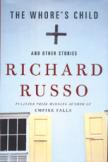You Still Can't Get There From Here
Right beneath the title, the jacket of The Whore’s Child displays a bare black cross; and we soon discover why. The subject of the title story is, of all things, an aging nun whose beloved absent father turns out to have been her (hated) mother’s pimp. What the embittered Sister Veronique has in common with most of the cast in the remaining six tales (or novellas) in this collection is her more or less permanent, but wholly un-redemptive pain. Not for nothing was this homely, engaging novelist raised a Catholic in Johnstown, N.Y. Richard Russo’s heroes tend to be bewildered boys whose parents’ failed marriages get even more dismal when, faute de mieux, they reconcile (Joy Ride, The Mysteries of Linwood Hart), or husbands who are either divorced (Poison), unfaithful (Buoyancy and The Farther You Go) or cuckolded (Monhegan Light).
Like Russo himself, some of his newest male characters may have escaped their bleak hometowns in the Rust Belt (he lives in Maine, and they’re New Englanders), but not their bleak, unpicturesque destiny. Man hands on misery to man, as Philip Larkin said; and so in The Farther You Go, Hank, still aching from prostate surgery, is goaded by his cranky wife, Faye, into driving their abusive son-in-law Russell to the nearest airport and shipping him as far away as the $200 left in June’s checking account will allow. (At the last moment Hank relents and gives Russell back his car, to go God knows where.)
Sheer formulaic misery? By no means. For Russo, whose career has been moving from strength to strength, with Mohawk (1986), The Risk Pool (1988), Nobody’s Fool (1993), Straight Man (1997) and the Pulitzer-Prize-winning Empire Falls (2001), is also a brilliant deadpan comic writer. His protagonists all know, or eventually learn, that they are foolsand just how little they can do about it. Russo has progressed from working-class poverty through academic respectability (the University of Illinois at Carbondale) to the affluence of literary stardom; and every step along the way seems to have enriched his social depth perception. The retired Professor Snow in Buoyancy, who has been replaced by a trendy ideological geek, suspects that the latter’s triumphant reception means his own colleagues secretly shared his dubious opinion of his life’s work. So at the question-and-answer session following the young man’s presentation (on Gender Otherness and Othering’), Snow asks whether students could apply his courses toward their foreign-language requirement. Be they fading authors, disgusted wives or discarded husbands, about the only half-reliable weapon left to Russo’s angry souls is their sharp tongue.
In a typical scene, 10-year-old Linwood Hart’s father (separated from his wife) takes his son out to eat.
They were no sooner seated in Rigazzi’s than Lin’s favorite waitress, the one who enjoyed giving his father a hard time, came over. I was beginning to think you’d died, Slick, she said; one hand on an ample hip, You never come in anymore.His father pretended to read the menu, Well, Jolene, I keep running into people I don’t like, his father said, indicating the far end of the restaurant where Lin’s uncle Brian sat eating spaghetti with his family.
Speaking of which, Jolene said, he wants to know if you’d like to join them.
Yeah? his father said. Tell him I know how much he’d like to spoil my dinner, but I’m not going to let him.
I’ll say no such thing, she assured him.
Suit yourself, his father said amiably. I’ll have the
Rigatoni and sausage, Jolene finished for him.
Rigatoni and sausage, his father confirmed as she wrote it down.
Now she raised an eyebrow in Lin’s direction. When he opened his mouth to speak, she said, Spaghetti and meatballs, wrote that down and then snatched the two menus. I could make other predictions, too, but I’d just depress myself.
Sure enough, minutes later the irascible Hart brothers are duking it out in the parking lot.
Such mayhem, petty or otherwise, is philosophically inevitable in Russo’s world; since, as he wrote about a year ago in The New York Times Book Review, having turned God out of the picture, moderns have nowhere to look for wisdom and purpose, except an extremely dubious and contradictory source: themselves. All the evidence suggestsno, shoutsthat this isn’t going to work; but humans plunge merrily (or miserably) ahead anyhow, while Richard Russo, calmly grieving, self-mocking observer-participant in the rout, reminds us how it’s going.
There are no stylistic pyrotechnics, à la John Updike, no convoluted allegories of ego, à la Philip Roth, just quirky, meandering, anticlimactic narratives with perfect-pitch dialogue about a bunch of ordinary male, female and pre-adolescent losers, who happen to inhabit certain neighborhoods in the Northeast, but who end up looking alarmingly (grin and bear it) like the rest of us.
This article also appeared in print, under the headline “You Still Can't Get There From Here,” in the October 21, 2002, issue.








